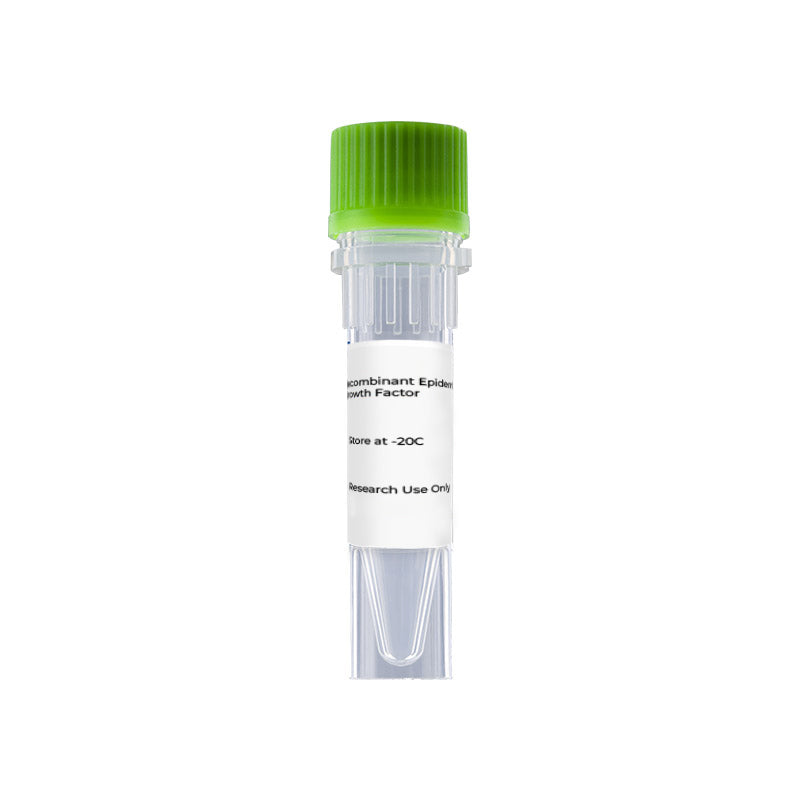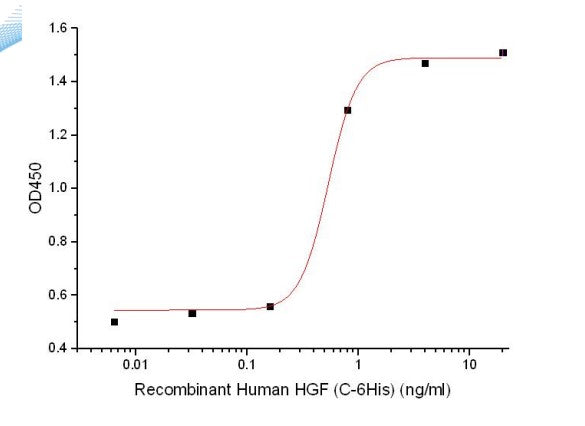1
/
of
2
Recombinant Human HGF (C-6His)
Recombinant Human HGF (C-6His)
Recombinant Human Hepatocyte Growth Factor is produced by our Mammalian expression system and the target gene encoding Gln32-Ser728 is expressed with a 6His tag at the C-terminus.
Catalog No:
EPT082
Regular price
$589.00 USD
Regular price
Sale price
$589.00 USD
Unit price
/
per
Couldn't load pickup availability
Product Details
Accession
P14210
Molecular Weight
26&53.7 KDa
Apparent Molecular Weight
32-38&50-65 KDa, reducing conditions
Purity
Greater than 95% as determined by reducing SDS-PAGE.
Endotoxin
Less than 0.001 ng/µg (0.01 EU/µg) as determined by LAL test.
Expression Host
Mammalian
Reconstitution
Always centrifuge tubes before opening.Do not mix by vortex or pipetting.
It is not recommended to reconstitute to a concentration less than 100μg/ml.
Dissolve the lyophilized protein in distilled water.
Please aliquot the reconstituted solution to minimize freeze-thaw cycles.
Shipping Condition
The product is shipped at ambient temperature. Upon receipt, store it immediately at the temperature listed in the Storage field.
Storage Condition and Shelf Life
Lyophilized protein should be stored at < -20°C, though stable at room temperature for 3 weeks.
Reconstituted protein solution can be stored at 4-7°C for 2-7 days.
Aliquots of reconstituted samples are stable at < -20°C for 3 months.
Background
HGF, is a pleiotropic protein in the Plasminogen subfamily of S1 peptidases and contains 4 kringle domains, 1 PAN domain and 1 peptidase S1 domain. HGF is secreted as an inactive 728 amino acid (aa) single chain propeptide. It is cleaved after the fourth Kringle domain by a serine protease to form bioactive disulfide-linked HGF with a 60 kDa alpha and 30 kDa beta chain. HGF binds heparan-sulfate proteoglycans and the widely expressed receptor tyrosine kinase, HGF R/c-MET. HGF regulates epithelial morphogenesis by inducing cell scattering and branching tubulogenesis. It can also alter epithelium morphology by the induction of nectin-1 alpha ectodomain shedding, an adhesion protein component of adherens junctions. HGF regulates cell growth, cell motility, and morphogenesis by activating a tyrosine kinase signaling cascade after binding to the proto oncogenic c-Met receptor. HGF is secreted by mesenchymal cells and acts as a multi-functional cytokine on cells of mainly epithelial origin. Its ability to stimulate mitogenesis, cell motility, and matrix invasion gives it a central role in angiogenesis, tumorogenesis, and tissue regeneration.
Analyte
HGF
Regulatory Status
For Research Use Only



